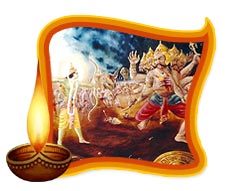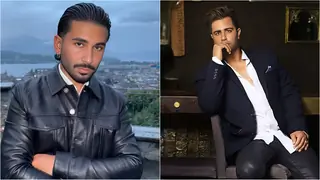wish u all a 😃😃
Here is the history of Diwali:
The history of Diwali is replete with legends and these legends are moored to the stories of Hindu religious scriptures, mostly the Puranas. Though the central theme of all legends point out to the classic truth of the victory of the good over the evils, the mode of their presentation and the characters differ. Diwali, being the festival of lights, lighting the lamp of knowledge within us means to understand and reflect upon the significant purpose of each of the five days of festivities and to bring those thoughts in to the day to day lives.

The five day of Diwali
The first day of Diwali is called Dhanvantari Triodasi or Dhanwantari Triodasi also called Dhan Theras. The second day of Diwali is called Narak Chaturdasi. It is the fourteenth lunar day (thithi) of the dark forthnight of the month of Kartik and the eve of Diwali. On this day Lord Krishna destroyed the demon Narakasur and made the world free from fear. The third day of Diwali is the actual Diwali. This is the day when worship for Mother Lakshmi is performed. On the fourth day of Diwali, Goverdhan Pooja is performed. The fifth day of the diwali is called Bhratri Dooj. It is a day dedicated to sisters.
Hindu Mythology
The Story of Rama and Sita: Lord Rama was a great warrior King who was exiled by his father Dashratha, the King of Ayodhya, along with his wife Sita and his younger brother Lakshman, on his wife's insistence. Lord Rama returned to his Kingdom Ayodhya after 14 years of exile, in which he put an end to the demon Ravana of Lanka, who was a great Pundit, highly learned but still evil dominated his mind. After this victory of Good over Evil, Rama returned to Ayodhya. In Ayodhya, the people welcomed them by lighting rows of clay lamps. So, it is an occasion in honor of Rama's victory over Ravana; of Truth's victory over Evil.
The Story of King Bali and Vamana Avatar(the Dwarf): The other story concerns King Bali, who was a generous ruler. But he was also very ambitious. Some of the Gods pleaded Vishnu to check King Bali's power. Vishnu came to earth in the form of a Vamana(dwarf) dressed as priest. The dwarf approached King Bali and said "You are the ruler of the three worlds: the Earth, the world above the skies and the underworld. Would you give me the space that I could cover with three strides?" King Bali laughed. Surely a dwarf could not cover much ground, thought the King, who agreed to dwarf's request. At this point, the dwarf changed into Vishnu and his three strides covered the Earth, the Skies and the whole Universe! King Bali was send to the underworld. As part of Diwali celebrations, some Hindus remember King Bali.
The Defeat of Narkasur by Lord Krishna: Lord Vishnu in his 8th incarnation as Krishna destroyed the demon Narkasura, who was causing great unhappiness amongst the people of the world. Narkasura was believed to be a demon of filth, covered in dirt. He used to kidnap beautiful young women and force them to live with him. Eventually, their cries for rescue were heard by Vishnu, who came in the form of Krishna. First, Krishna had to fight with a five-headed monster who guarded the demon's home. Narkasura hoped that his death might bring joy to others. Krishna granted his request and the women were freed. For Hindus, this story is a reminder that good can still come out of evil.
Krishna and The Mountain: In the village of Gokula, many years ago, the people prayed to the God Indra. They believed that Indra sent the rains, which made their crops, grow. But Krishna came along and persuaded the people to worship the mountain Govardhan, because the mountain and the land around it were fertile. This did not please Indra. He sent thunder and torrential rain down on the village. The people cried to Krishna to help. Krishna saved the villagers by lifting the top of the mountain with his finger. The offering of food to God on this day of Diwali is a reminder to Hindus of the importance of food and it is a time for being thankful to God for the bounty of nature.
Sikh Festival Diwali
In Sikh perspective, Diwali is celebrated as the return of the sixth Guru, Guru Hargobind Ji from the captivity of the city, Gwalior. To commemorate his undying love for Sikhism, the towns people lit the way to, Harmandhir Sahib (referred to as the Golden Temple), in his honour.
Jain Festival Diwali
Among the Jain festivals, Diwali is one of the most important one. For on this occasion we celebrate the Nirvana of Lord Mahavira who established the dharma as we follow it. Lord Mahavira was born as Vardhamana on Chaitra Shukla 13th in the Nata clan at Khattiya-kundapura, near Vaishali. He obtained Kevala Gyana on Vishakha Shukla 10 at the Jambhraka village on the banks of Rijukula river at the age of 42.
DIWALI - CUSTOMS & TRADITIONS
Many interesting rituals and traditions have attached themselves to Diwali and one can find a little regional variation in them in different parts of India. However, one of the unique customs of Diwali consists of indulgence in gambling, normally considered a vice, in North India. It is said that while Goddess Parvati was playing dice with her spouse Lord Shiva on this day, she enjoyed herself so much that she said that whoever will gamble on Diwali night would remain prosperous throughout the year. Nowadays, dice has become obsolete and have been replaced by cards. However, many people put a limit to the stakes that can be played, especially for the kids.
Diwali is a 5 day long festival.
The 1st day is known as 'Dhanteras'. People renovate and decorate their houses and workplaces on this day and make traditional 'Rangoli' motifs on the entrance to welcome Goddess Lakshmi. Lamps and candles are lit throughout the night. It is considered auspicious to buy gold and silver on this day. Many people opt for buying new utensils on this day. In Maharashtra, offerings of lightly pounded dry coriander seeds with jaggery are made to the Goddess. Rural people revere their cattle on this day and cows are considered especially auspicious.
On 2nd day, people take bath before sunrise anointing themselves with oil and 'Ubtan' (scrub made up of gram flour and fragrant powders). Bengalis believe that Goddess Kali killed the demon Raktavija on this day.
The 3rd day is the main day of the Diwali festival. Jains have their own religious significance of the day, as they believe, that it is on this day Lord Mahavir attained 'Nirvana' (or Eternal Bliss). Swami Dayananda Saraswati, the great saint who gave rise to Hindu Renaissance, also left the mortal world on this day. On this day, people wear new clothes and share gifts and sweets with their friends and relatives. Women prepare delicacies and whole house is illuminated with 'diyas' and candles. Fireworks and crackers are the kids' favorites on this day.
On the 4th day is the 'Govardhan-Puja' or 'Annakoot'. In the temples of Mathura and Nathadwara, the deities are bathed with milk and adorned with precious clothes and ornaments. Then offerings of a large variety of delicacies are made to them.
The 5th day or the last day of this festival is called ' Bhai Duj '. On this day, sisters invite their brothers and their family to their homes and treat them with delicacies. In turn, brothers offer them with gifts and sweets.
In each of the simple traditions and rituals at Diwali there is a tale of significance and credo. Apart from the celebration of Rama's return to Ayodhya, historically too, the origin of Diwali can be traced back to ancient India, when it was probably an important harvest festival.
Diwali that is the 15th day of the month of Kartik is a holiday and is celebrated with fervor and gaiety. Being a New Year day all financial transactions remain closed on this day. Lord Ganesh, the elephant-headed god, the symbol of auspiciousness and wisdom, is also worshipped in most Hindu homes on this day.
Diwali is celebrated in many ways:
In North India on the day of the Diwali the children emerge, scrubbed clean to get into their festive attire, and light up little oil lamps, candles and agarbathis the wherewithal for setting alight crackers and sparklers.
On this day there is a traditional practice, specially in Maharashtra, of taking bath before sunrise with oil and "Uptan" (paste) of gram flour and fragrant powders.
In South India the day is celebrated in a unique way. People wake up before sunrise prepare blood by mixing Kumkum in oil and after breaking a bitter fruit that represents the head of the demon King that was smashed by Krishna, apply that mixture on their foreheads. Then they have an oil bath using sandalwood paste.
The illumination of homes with lights and the skies with firecrackers is an expression of obeisance to the heavenly for the attainment of health, wealth, knowledge, peace and fame. According to one belief, the sound of fire-crackers are an indication of the joy of the people living on earth, making the gods aware of their plentiful state. Still another possible reason has a more scientific basis: the fumes produced by the crackers kill a lot of insects, found in plenty after the rains.
The tradition of gambling on Diwali also has a legend behind it. It is believed that on this day, Goddess Parvati played dice with her husband Lord Shiva and she decreed that whosoever gambled on Diwali night would prosper throughout the ensuing year.
Shina





























